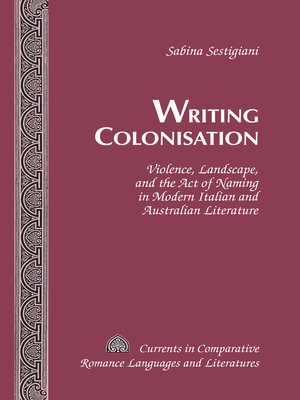Writing Colonisation
ebook ∣ Violence, Landscape, and the Act of Naming in Modern Italian and Australian Literature · Currents In Comparative Romance Languages and Literatures
By Tamara Alvarez-Detrell

Sign up to save your library
With an OverDrive account, you can save your favorite libraries for at-a-glance information about availability. Find out more about OverDrive accounts.
Find this title in Libby, the library reading app by OverDrive.



Search for a digital library with this title
Title found at these libraries:
| Library Name | Distance |
|---|---|
| Loading... |
Writing Colonisation: Violence, Landscape, and the Act of Naming in Modern Italian and Australian Literature offers a unique comparative analysis of modern Italian and Australian literature which has never been attempted at such length and depth. The book investigates the relation between language, violence, and colonialism through comparing and contrasting selected texts in the Italian and Australian tradition (Dino Buzzati, Ennio Flaiano, Guido Ceronetti, Patrick White, David Malouf, Randolph Stow, and Barbara Baynton) and submitting them to a close analysis. The literary analysis is complemented by a critical reflection on philosophical discussions of language in continental philosophy, especially in the works of Walter Benjamin, Maurice Blanchot, and Martin Heidegger.
The book provides innovative insights into colonialism, shedding new light and ideas on the works of the authors under analysis. The book argues for a novel reading of Italian and Australian texts and employs this reading to interrogate the ways in which language has been deployed to negotiate the colonial experience – especially in relation to the interface between language and landscape – and relates this experience to Western interpretation of religious texts (e.g., Genesis), which have often been used as a justification of colonial exploitation. The book is an excellent reference for courses on comparative literature and postcolonial literature.
The book provides innovative insights into colonialism, shedding new light and ideas on the works of the authors under analysis. The book argues for a novel reading of Italian and Australian texts and employs this reading to interrogate the ways in which language has been deployed to negotiate the colonial experience – especially in relation to the interface between language and landscape – and relates this experience to Western interpretation of religious texts (e.g., Genesis), which have often been used as a justification of colonial exploitation. The book is an excellent reference for courses on comparative literature and postcolonial literature.







